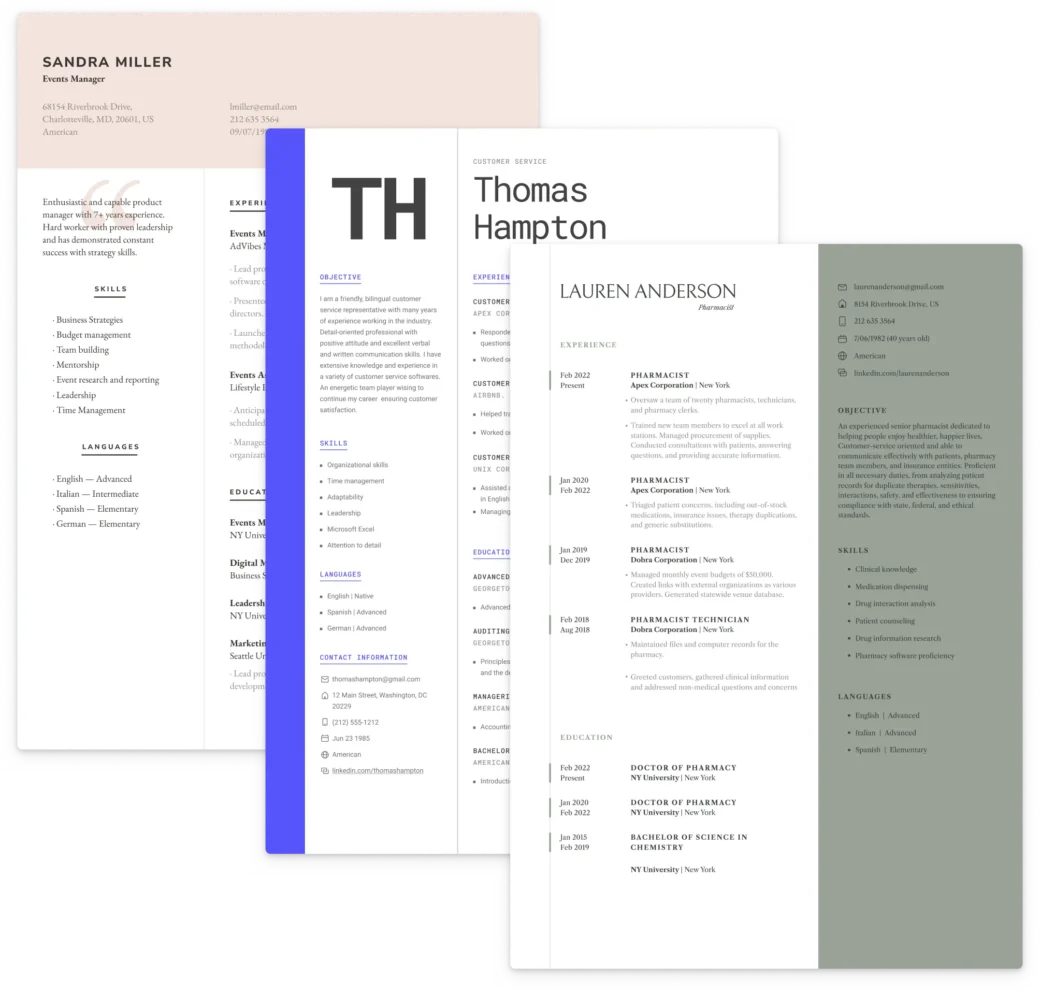The world has become an exciting roller coaster ride, hasn’t it? A ride marked by change, adaptability, and a significant shift toward remote work.
Entire industries have gone remote, allowing for an unprecedented volume of career opportunities uninhibited by geographical constraints.
Whether you are now applying for a remote, hybrid, or office-based position, we can help you list your remote experience on your resume.
In this article, we’ll tackle your burning questions about presenting remote work when writing your resume:
- How to detail your remote work history
- How to draft relevant remote skills
- How to present your accomplishments
When you have learned all there is to know about how to make your remote experiences shine, use our AI resume builder to get instant suggestions for listing your relevant remote and hybrid experience!
Let’s begin!
Why Remote Work Experience Matters: Spotlighting Its Worth
In today’s job market, just about everyone wants to work remotely. In fact, a study by Buffer found that 98% of remote workers wish to continue working remotely for the rest of their careers.
That means there will be plenty of competition for remote and hybrid jobs, so hiring managers want to see that you have remote experience to show that you have:
- Flexibility: Proves your ability to manage tasks independently and adjust to changing environments.
- Proficiency with digital tools: Highlights your competence in using remote collaboration and communication platforms.
- Time management skills: Shows you can effectively organize your schedule and meet deadlines without direct supervision.
- Advanced communication skills: Proves you have strong written and verbal communication abilities, essential for virtual teamwork.
With our AI builder’s instant suggestions that help you include these traits and your remote experience in your resume, as well as an expert resume review, you can make the job search process easier.
Remote work demonstrates your flexibility and adaptability
Including remote work on your resume will demonstrate to employers that you are flexible. Not only does this mean that you’ve mastered the art of balancing professional obligations with personal responsibilities, but it also implies that you know how to manage your time sensibly.
You’ve unlocked the talent to match your work rhythm with the natural ebb and flow of your energy levels, and that is indeed a superpower.
Knowing how to handle your own home-office equipment issues, working in isolation, and dealing with noise from family members and pets are just a few examples of the challenges of working at home. Communicating effectively under these circumstances becomes key, which brings us to the next point.
Communication is important in work-from-home set-ups
Gone are the days when communication was confined to dropping by a co-worker’s desk, in-person meetings, phone calls, and cubicle conversations. Today, it flows seamlessly through digital channels, binding remote teams together.
Managing this kind of communication effectively (navigating all those pop-ups and notifications, choosing your video call background, managing your online calendar, etc.) is a valuable skill that employers are now on the hunt for, as revealed by a Harris Poll on behalf of Grammarly study.
According to the survey, 72% of managers and business leaders believe that good communication leads to increased productivity.
Including remote work experience on your resume signals to potential employers that you’re well-prepared for the future of employment, harnessing both flexibility and effective online communication to your advantage.
How to Put Remote Work on a Resume – Making Virtual Work Visible
If you’re already an expert at working at home, you might be wondering how to write about your remote work experience on your resume.
If that’s the case, it’s essential to list your remote history the right way. That means you have to mention the following on your resume:
- Mention your current location as well as your office’s location
- Include “remote” alongside your location
-
💡 Our expert’s advice

You can highlight your remote work experience at the top of your resume, alongside your contact info. For example, you might write, “San Francisco, CA (Remote).”
Here’s a work-from-home resume sample from the work experience section:
Experience
XYZ Company, Los Angeles office
Remote – Based in Sacramento, California
November 2022 – Present
Have a look below at what skills should be added if you would like to be hired in a fully remote or hybrid position.
1. Add your experience with remote work software
Showing that you are capable of using certain software is key to landing a remote job.
The best way to show your work-from-home skills on your resume is by highlighting that you have experience using all the necessary tools. This list of IT and technology skills can include:
- Remote collaboration software: Mention how you have expert knowledge of Zoom, Dropbox, Google Workspace, Microsoft Office 365, or any other cloud-based co-working tools.
- Project tracking software: State that you know how to use project management tools like Asana, Jira, Slack, Trello, or Kanban that make teamwork with your coworkers more streamlined and efficient.
It also doesn’t hurt to mention that you know how to use Microsoft Teams, Adobe PDF editors, and other basic software that’s typically used in an office setting.
2. Demonstrate your remote job key skills throughout your resume
You’ll need to include that you not only know how to use the appropriate software but that you’re also great at being organized.
Mentioning certain organizational skills will help show that you can manage your tasks and time when working from home. This is why you should mention skills such as:
- Time management
- Being adaptable and flexible
- Independent problem solving
- Managing interruptions
- Clear written and spoken communication
- Working from different time zones if you have worked from Europe or another country.
Those are the ideal qualities for remote or hybrid workers who need to show they can manage to do tasks at home.
-
💡 Our expert’s advice

The summary section of your resume is another great place to emphasize your remote work experience. If you’ve spent a significant amount of time telecommuting, you could include a statement such as, “Brings X years of experience collaborating remotely with teams across X time zones.”
Here is an example of a resume summary that includes these skills and should help you impress any hiring manager.
Summary
Highly skilled graphic designer with 5+ years of experience in digital brand management, logo design, and layout design in remote environments. Proficient in Adobe Photoshop and InDesign, specializing in creative marketing and campaign execution. Detail-oriented and adaptable team player dedicated to enhancing creative processes and fostering team success in remote settings.
You should always name the systems and software you have experience with. It also helps to include metrics that demonstrate your accomplishments with this software.
Take a look at examples of how to mention remote skills throughout your resume to show you have the necessary relevant experience.
Self-sufficiency
Companies are captivated by candidates who can efficiently manage their schedules and stick to them without supervision. Show examples of how you’ve thrived in independent roles, displaying your ability to take initiative.
Drove 15% increase in repeat business by independently developing and implementing a customer relationship management system to track and analyze sales data.
Flexibility
Exhibit your adaptability by describing how you’ve maneuvered through diverse situations or pivoted your responsibilities while working remotely—making it clear that you can tackle any curveball thrown your way.
Increased user engagement by 30% and boosted sales by 20% by pivoting marketing strategy with a fully remote team in response to changing market dynamics and customer preferences.
Productivity
Being successful working remotely means staying productive while avoiding the distractions of a home environment.
Share specific instances where you’ve crushed deadlines or impressively surpassed expected targets, and include metrics where possible.
Maintained a resolution rate of over 90% while handling an average of 50 calls per day from my home office to exceed performance benchmarks consistently.
Communication
In a virtual world, demonstrating your aptitude for clear and engaging communication is crucial. Mention how you’ve collaborated effectively with remote coworkers and your mastery of tools like Microsoft Teams, Slack, or Zoom.
Increased sales by 15% during Q4 2020 while working remotely and maintaining consistent communication with dispersed team members in different time zones.
Set yourself apart with these work-from-home skills, backed by solid examples that demonstrate your experience working in a remote environment while they also showcase your expertise to get yourself in the ‘to interview’ pile.
3. Include your remote work achievements
Highlighting skills is key, but you also want to make sure to show off a bit, without exaggerating, of course.
Try to include any instances you’ve met or passed expectations working from home.
These examples will show you how to describe how you evolved during your experience working remotely and will assist you in refining and polishing your career narrative.
Exceeding expectations
If you’ve gone above and beyond your targets while working from your home office, flaunt it!
Boosted sales by 25% in Q3 2021 during remote working tenure, surpassing the expected targets of the team.
Management at a distance
Remote work often involves juggling projects virtually and managing teams or external providers virtually; if you’ve succeeded here, share the details.
Successfully managed a cross-functional team of 10 people across 5 time zones to launch a new marketing campaign.
Collaboration
Remote work is all about effective collaboration. If you’ve excelled in this area, it’s an accomplishment worth mentioning.
Spearheaded a bi-weekly virtual sync-up meeting and implemented Asana project management software, improving team communication and speeding up the project completion rate by 30%.
Common Mistakes to Avoid When Listing Remote Work
Learning how to list a remote job on a resume also includes becoming familiar with some of the common mistakes. Keep reading to ensure that your resume communicates your capabilities as a remote worker.
Don’t be vague when listing the role
Remote work is not just about working from home but the skills you possess to efficiently perform tasks remotely. Simply listing “remote work experience” without delving deeper into specifics results in a bland, uninformative narrative.
Instead, focus on what you accomplished during your remote work experience, mention the tools you used, and quantify the impact of your work without fabricating anything.
For example: “Led a remote sales team of 10 across two time zones using Slack and Zoom, implementing weekly strategy meetings and real-time performance tracking. Optimized the sales funnel through data-driven insights, resulting in a 15% increase in quarterly revenue and a 20% improvement in client retention rates..”
Don’t leave out your remote working soft skills
Not emphasizing relevant soft skills is another common resume slip-up. Remote working requires a specific set of skills, such as time management, self-discipline, and communication.
Show these skills in the context of your remote work setting when you are updating your resume.
For example: “Implemented structured time-blocking and priority-based task management, guaranteeing 100% of deadlines were met. Used project management tools like Trello and Asana to improve workflows, resulting in 20% of tasks being completed ahead of schedule.”
Don’t Forget to Adapt to Each Job Posting
Every remote role will have unique requirements. Failing to tailor your resume according to each role will lead to missed opportunities.
Review each job posting thoroughly. If the role requires familiarity with certain project management software or video conferencing tools, make sure you highlight your experience with those tools.
For example: “Used Asana to track tasks, manage deadlines, and encourage team collaboration. Integrated with Slack for real-time updates, guaranteeing 100% on-time project completion and boosting team efficiency by 25%.”
Concluding Our Guide to Listing Your Remote Experience
As the work landscape evolves, the rise in remote work opportunities has undoubtedly caught the attention of many job seekers. According to a survey conducted by remote.co, 84% of respondents shared that the top factor they use to evaluate job opportunities is remote work.
To make an impression in today’s job market, adapting your resume to feature remote work experience and skills is of paramount importance. In doing so, you will demonstrate your flexibility and adaptability to different work environments.
Leaving no stone unturned, invest in crafting a resume that stands out in the competitive job market and displays your potential employers the unparalleled value you bring to their company. Why not try out our resume builder to streamline the process for you?
If you need expert guidance to draft your resume, try our easy-to-use resume templates, and you will be done in no time. Then you can go ahead and write your notice letter for the office job you no longer want, and get working remotely!

Build your perfect resume with ease
Craft the perfect resume effortlessly with our builder. Get started today!
Related Posts

